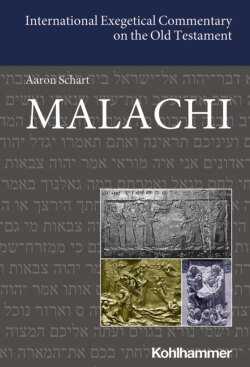Читать книгу Malachi - Aaron Schart - Страница 27
На сайте Литреса книга снята с продажи.
Summary Interpretation (Synthesis)
ОглавлениеThe superscription in Mal 1:1 ties the final document into the collection of the Book of the Twelve Prophets. The number twelve suggests a certain completeness, analogous to the idea that the people Israel is made up of twelve tribes. In addition, there may be a reference to the analogy by which the three “great” prophetic books are related to the twelve “minor” books as the patriarchs Abraham, Isaac, and Jacob are to Jacob’s sons.11 Independently of whether that was the original authorial concept, it is a fact that the Hebrew canonical series of prophets ends with Malachi. That need not mean the end of prophecy, but future prophetic figures must be able to present themselves as interpreters of canonical prophecy or as fulfilling prophetic sayings about the future if they are not to fall under suspicion of being false prophets (cf. Zech 13:1–6).
The superscription of the Malachi document combines, for the first and last time, the two most important generic concepts (משׂא and דבר־יהוה) contained in the openings of the prophetic writings that precede it. This makes it clear that both genres—the “weighty words” that have been primarily directed against foreign nations and the “word of Yhwh” are mutually enhancing, and in such a way that the weighty speech is one aspect of the word of Yhwh.
The Malachi document presumes the end of the exile In accord with the structure of the Book of the Twelve Prophets, the Malachi document presupposes the end of the Babylonian exile and the rebuilding of the temple. The superscription makes it clear that there is a link to preexilic prophecy; the exile has not made prophecy superfluous. The suggestion is that the two most important speech genres are again in use. The great spiritual turn in Israel that was the goal of the exile remains incomplete, because even now that the temple is again in use there are conditions that call for criticism and Malachi must once more call for return (Mal 3:7).
But if we look more closely at what, in fact, is expressed in terms of the old generic categories, we find a consequential change: while the prophet still appeals to Yhwh’s authority to support his preaching, the prophet’s words are now directed at counter-questions and toward questioning, doubting countenances (not described, but to be imagined) that face the prophet. These are what drive him, again and again demanding explanations and additional “arguments” from him.
Does “Israel” also include the Diaspora? Likewise the fact that the concept of “Israel” appears in a superscription after the Babylonian exile should cause us to give pause. That Israel continues to exist, even after the exile, implies that the God of Israel holds fast to the people of God, even beyond the time of its punishment. Still, we must ask ourselves what the name “Israel” now represents: certainly no longer the preexilic Israel, understood as a kingdom, but rather for a renewed Israel that has endured exile. Nowhere can we find a distinction between those who remained in the Land and those who were taken away to Babylon. It is difficult to say whether the Diaspora is included in the name “Israel.” According to Mal 1:5, Israel is a circumscribed geographical entity. Yet, according to Mal 2:11a, it is a community that is to be distinguished from Judea and Jerusalem. In Mal 2:16 and especially 3:22 [4:4 ET]), which speak explicitly of “all Israel,” it is Yhwh’s covenant partner. The last two passages may well include the worldwide Diaspora, even though that is not said explicitly.12
Still, the idea of Israel is also employed when Zechariah 14 describes the eschatological role of Israel on the day of Yhwh. In that context Israel is also a factor in God’s eschatological plan of salvation. Israel will be purified and will worship the God of the whole world in a sanctified Jerusalem; Israel will also lead the remnant of the nations to celebrate Sukkoth together (Zech 14:16). Then enduring peace will rule, but until then Israel’s obligation is to shape the worship at the temple and its daily life in such a way that they remain oriented toward the eschatological goal.
Malachi as God’s messenger The word of God for this Israel is given “into the hands” of a person whose name recalls the various passages in the Malachi document that speak of a “messenger.” Even if it may be assuming a too complicated structure of thought to suppose that the prophet himself claims to be the messenger about whom the writing speaks, there are suggestions of associative links.13 The prophet’s name invites special attention on the part of the audience to the multiple messenger figures, the “messenger of Yhwh” (Mal 3:1a), the “messenger of the covenant” (3:1b), the “messenger of Yhwh of hosts” (2:7), all of them found in secondary insertions. It is Yhwh himself, so the text suggests, who commissions various messenger figures to make known the one “word of Yhwh.”
